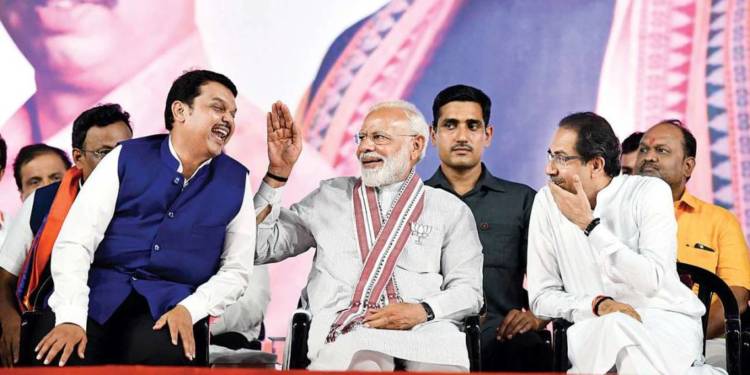As we approach closer to the state assembly elections in Maharashtra, political parties have certainly shifted gears to face the upcoming electoral challenge in the critical western state. Taking the lead in innovative electoral practices is certainly the BJP led by Maharashtra CM Devendra Fadnavis, which has once again taken the spotlight due to its diligent and efficient organisational planning.
This time around with scales tilted largely in favour of BJP given a successful 5 year term, BJP has further moved ahead to put in mechanisms to hold off any leakages. In a similar move the saffron party led by CM Fadnavis has planned to deploy a group of senior leaders in assembly constituencies in a bid to pre-empt any intra party rebellion after the selection of the candidates for the upcoming elections scheduled for October 21.
A senior BJP leader told the Hindustan Times, “We have at least three to five strong contenders for every seat; and only one can get {the party} ticket. Our biggest challenge is to manage {a potential} rebellion after distribution of tickets,” the BJP leader said. “We will depute a ‘damage control team’ in each assembly constituency to pre-empt any sabotage by those who do not get a ticket.”
Now with Shiv Sena further expected to join in with the BJP contrary to last assembly polls in 2014, several leaders of BJP are poised to be left without the endorsement of the party given their assembly seats might go to Shiv Sena or any other possible candidates from within the BJP.
“We saw a similar race for party tickets in 2017 assembly election in Uttar Pradesh. An efficient management of sulking leaders following distribution of tickets helped us win UP with a huge margin. Maharashtra is also too big a state to allow any slip,” another BJP leader told the Hindustan Times. However for BJP this tactic is nothing new and has been effectively used by Amit Shah and PM Modi in Gujarat. Due to this policy, Narendra Modi retained his supremacy in Gujarat from 2001-2013. Despite him becoming the Prime Minister, following this model, Gujarat BJP won the 2017 assembly polls. On the other hand, due to lack of skilled leadership in the opposition parties in Maharashtra, many important leaders are joining the BJP. These include Radhakrishna Vikhe Patil and his son, NCP strongman Ganesh Naik, etc. as prominent leaders. In such a situation, the BJP has implemented this decision at the right time to keep its leadership strong and to control any kind of rebellion.
BJP with this move is aiming to avoid situations that it had surfaced in the last Delhi assembly polls where several disgruntled leaders of the saffron party had allegedly sabotaged the electoral plans.
In the run up to the 2015 Assembly polls in Delhi, BJP had fielded Kiran Bedi as its Chief Ministerial candidate. It was seen as BJP’s masterstroke at that time, however, things did not go the way party top brass had hoped for. Several leaders found Bedi authoritative and less accomodative with some dissenting against her for being “parachuted” in the BJP without any grassroots work.
However, now by putting senior leaders in assembly constituencies the BJP is expected to soothe out any rebellion or at least minimise any negative effect of such rebellions. Nonetheless BJP clearly has an edge when it comes to the state politics, with the momentum gained from the Lok Sabah verdict in May coupled with the work done under the leadership of CM Devendra Fadnavis, BJP enjoys a comfortable electoral support in the state.
In the last five years, CM Fadnavis has turned out to be an exceptional leader, completely wiping out the opposition. NCP and Congress have lost ground in the state like never before. With the opposition marginalised in the state and the party under Devendra Fadnavis invaded deep inside the state through development projects where Fadnavis has aggressively pushed for infrastructure development, especially in the city of Mumbai which accounts for more than one-fourth of the annual output of the state. The underdeveloped Vidarbha region also bagged major investment in infrastructure project which has already earned dividends in the LS polls for NDA.
Maharashtra, for the last 5 years has witnessed massive steps forward in several critical domains like Agriculture, Water Resources and others. Vidarbha, a region of eastern Maharashtra, which had for long been on the back seat of Maharashtra’s political agenda, has taken the spotlight after unprecedented development in the region after BJP formed the government in state. The central and state governments with their combined efforts have been successful in implementing ambitious development programs in the state. Several infrastructure projects like, Mumbai monorail, mass housing scheme of Navi Mumbai town planning authority City and Industrial Development Corporation of Maharashtra’s (Cidco), metro projects in Mumbai and Pune and others have also added to the popularity of the BJP. The state also recently got Rs 41,000 crore in infrastructure projects.
On the other end of the spectrum for the Congress and NCP, these assembly polls are nothing short of an existential battle, with senior leaders losing on erstwhile strongholds of respective parties. Several senior leaders from the opposition have also jumped ships taking note of the situation in their parties. However, with the elections nearing in several other factors are sure to impact the final results; likewise this particular tactic of deploying senior leaders, straight from the handbook of Amit Shah, is surely poised to greatly benefit the BJP. Nonetheless, for the BJP the main agenda would surely be to project the developmental work done under the leadership of Devendra Fadnavis and maintain the victory momentum.



























